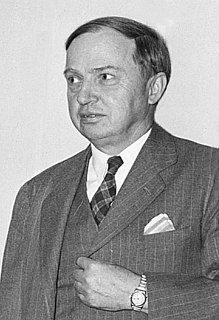A Quote by Frank Herbert
Order generally was a product of human activity. Chaos existed as a raw material from which to create order.
Related Quotes
When I'm making the movie, I absolutely do. I work so hard, and out of the raw material that is the script and talks I have with the director, the writer, I create, I hope, a very specific person who wouldn't have otherwise existed. However, do I then attach and hang on to the finished product? No. The experience of the creation of the character is what feeds me, what excites me, challenges me.
In times of widespread chaos and confusion, it has been the duty of more advanced human beings--artists, scientists, clowns and philosophers--to create order. In times such as ours, however, when there is too much order, too much management, too much programming and control, it becomes the duty of superior men and women to fling their favorite monkey wrenches into the machinery. To relive the repression of the human spirit, they must sow doubt and disruption.
Wilderness is the raw material out of which man has hammered the artifact called civilization. Wilderness was never a homogenous raw material. It was very diverse. The differences in the product are known as cultures. The rich diversity of the worlds cultures reflects a corresponding diversity. In the wilds that gave them birth.
Gardeners may create order briefly out of chaos, but nature always gets the last word, and what it says is usually untidy by human standards. But I find all states of nature beautiful, and because I want to delight in my garden, not rule it, I just accept my yen to tame the chaos on one day and let the Japanese beetles run riot on the next.





































